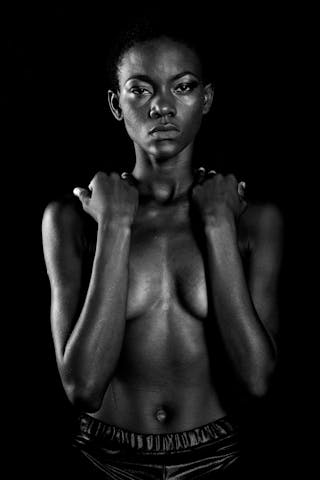The concept of sexuality being a choice is a complex and controversial topic. Many people believe that sexual orientation is innate and not something that can be changed or chosen. However, there are also those who argue that being bisexual is a choice and that individuals can choose to be attracted to both men and women. In this article, we will explore the idea of bisexuality as a choice and discuss the implications it has for the dating world.
Curiosity killed the cat, but satisfaction brought it back. Or so the saying goes. When it comes to the age-old debate surrounding bisexuality, the myth of choice is just that - a myth. It's time to delve deeper into the complexities of human sexuality and explore the truth behind this often-misunderstood orientation. For a deeper look into the world of sexual exploration, check out this link for some eye-opening reviews.
The Nature of Bisexuality
Check out this review of Abby Winters on SexyLinx and see why you should try it out!
Bisexuality is commonly defined as the sexual attraction to both men and women. It is a diverse and complex orientation that can manifest in a variety of ways. Some bisexual individuals may feel equally attracted to both genders, while others may have a preference for one over the other. The experience of bisexuality is unique to each person and can be influenced by a multitude of factors, including upbringing, social environment, and personal experiences.
Find your Jewish soulmate with JPeopleMeet and take the first step in finding love today!
The Argument for Bisexuality as a Choice
Explore new ways to connect and chat with potential dates
Those who argue that bisexuality is a choice often believe that individuals have the ability to control their sexual desires and attractions. They may claim that people can choose to explore relationships with both men and women, and that sexual orientation is not predetermined. This perspective challenges the notion that sexuality is fixed and unchangeable, and suggests that individuals have agency in determining their own attractions.
The Implications for Dating
If being bisexual was actually a choice, it would have significant implications for the dating world. It would mean that individuals have the freedom to choose their partners based on personal preferences and desires, rather than being limited by societal norms or expectations. This could lead to greater diversity and inclusivity in the dating pool, as people would be more open to exploring relationships with individuals of different genders.
However, the idea of bisexuality as a choice also raises ethical questions about consent and authenticity. If someone were to enter a relationship with a person of a different gender simply because they chose to be bisexual, it could raise concerns about the integrity of the relationship and the motivations behind it. It is important to consider the impact of choice on the dynamics of dating and relationships, and to ensure that all parties involved are making informed and consensual decisions.
The Reality of Bisexuality
Despite the argument that bisexuality is a choice, many individuals who identify as bisexual maintain that their attractions are innate and not something that can be controlled. The experience of bisexuality is often shaped by internal and external factors, and individuals may struggle with societal stigma and prejudice. It is important to acknowledge and respect the lived experiences of bisexual individuals, and to recognize the validity of their sexual orientation.
Ultimately, the question of whether bisexuality is a choice is a complex and nuanced issue. While some may argue that individuals have agency in determining their attractions, it is essential to approach the topic with sensitivity and understanding. The dating world can benefit from greater awareness and acceptance of diverse sexual orientations, and by creating an inclusive environment for individuals of all backgrounds and experiences.
Conclusion
The concept of bisexuality as a choice challenges traditional notions of sexual orientation and raises important questions about agency and consent. While some may argue that individuals have the freedom to choose their attractions, it is crucial to consider the lived experiences of bisexual individuals and the impact of societal attitudes on their identities. The dating world can benefit from greater inclusivity and understanding of diverse sexual orientations, and by creating a supportive environment for individuals of all backgrounds.
- https://find-a-girlfriend.thehottieandthenottie.com/posts/erotic-sex-how-to-have-erotic-sex/
- https://hookup-blog.timebombrecordings.com/posts/pandemic-diary-a-newly-single-woman-navigating-a-breakup/
- https://singles.campsupernow.com/posts/lesbian-dating-apps-2022-8-best-lesbian-and-queer-dating-apps/
- https://find-a-girlfriend.thehottieandthenottie.com/posts/this-simple-sex-tip-completely-changed-how-i-think-about-blow-jobs/
- https://online-personals.thehottieandthenottie.com/posts/monomanic-dating-what-is-monomanic-dating/
- https://datingguide.getweps.com/posts/how-12-guys-really-feel-about-having-their-balls-touched-during-oral-sex/
- https://hookup-blog.campsupernow.com/posts/your-guide-to-tiktoks-biggest-dating-trends/
- https://hookupguide.thehottieandthenottie.com/posts/sex-toy-for-beginners-beginner-sex-toys/
- https://dating-services.fu-direct.net/posts/creating-an-asexual-character-for-tv-showed-me-we-have-a-way-to-go/
- https://sex-chat.campsupernow.com/posts/anal-sex-what-does-anal-feel-like/
- https://hookup.campsupernow.com/posts/what-does-demisexual-and-demiromantic-mean/
- https://meet-women.campsupernow.com/posts/polyamory-diaries-12-can-a-marriage-survive-without-sex/
- https://singles-website.themountaintopplay.com/posts/my-best-sex-ever-was-when-i-dominated-him/
- https://dating-app.themountaintopplay.com/posts/cheap-sex-toys-17-best-cheap-vibrators/
